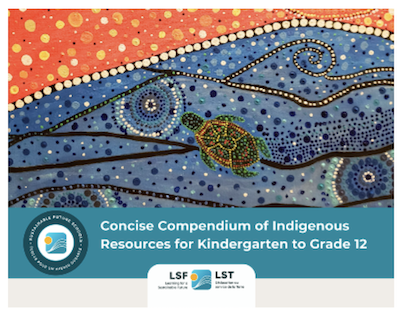- Home
- Tutorial
- Resource Guides
- Focus Areas
- LSF Programs
-
Professional
Development - Review Process
-
A project of LSF

Search for Resources


Indigenous Knowledge
In our commitment to reconciliation, it is essential to take proactive steps to integrate Indigenous perspectives into the classroom. Learning for a Sustainable Future (LSF) has carefully selected and reviewed a wide range of Indigenous resources available in the Resources for Rethinking database. Many of these materials highlight pedagogies such as Etuaptmumk/Two-Eyed Seeing, seasonal teachings, and land-based learning to deepen student understanding.
These resources are designed to support both Indigenous and non-Indigenous educators in enhancing their teachingknowledge of Indigenous cultures and ways of knowing. To further enrich learning, educators are encouraged to collaborate with Elders and establish partnerships with local Indigenous communities and organizations. Incorporating Indigenous content across subjects helps create inclusive, culturally responsive classrooms that recognize and value both Indigenous and Western ways of knowing.
These resources are designed to support both Indigenous and non-Indigenous educators in enhancing their teaching of Indigenous cultures and ways of knowing. To further enrich learning, educators are encouraged to collaborate with Elders and establish partnerships with local Indigenous communities and organizations. Incorporating Indigenous content across subjects helps create inclusive, culturally responsive classrooms that recognize and value both Indigenous and Western ways of knowing.
Indigenous Search Tool on R4R
To access more resources for Indigenous education, the Resources for Rethinking website features an Indigenous search tool that helps educators find educational materials related to Indigenous knowledge, perspectives, and reconciliation. This tool allows teachers to explore various themes, such as:
Additional Resources
LSF has created a concise compendium of Indigenous resources to help educators get started. Centered on Indigenous Ways of Knowing and the Etuaptmumk/Two-Eyed Seeing approach, the compendium offers carefully selected tools and materials to enhance educators’ understanding of Indigenous Peoples’ knowledge and culture, supporting both Indigenous and non-Indigenous teachers. It includes lesson plans, books, videos, and other resources created by Indigenous authors, artists, and Knowledge Keepers. Click on the cover to access the resource

Two of our Hot Topics, the National Day for Truth and Reconciliation and National Indigenous Peoples Day, are scheduled to coincide with national campaigns that highlight these important issues and encourage both students and teachers to participate in these events.

